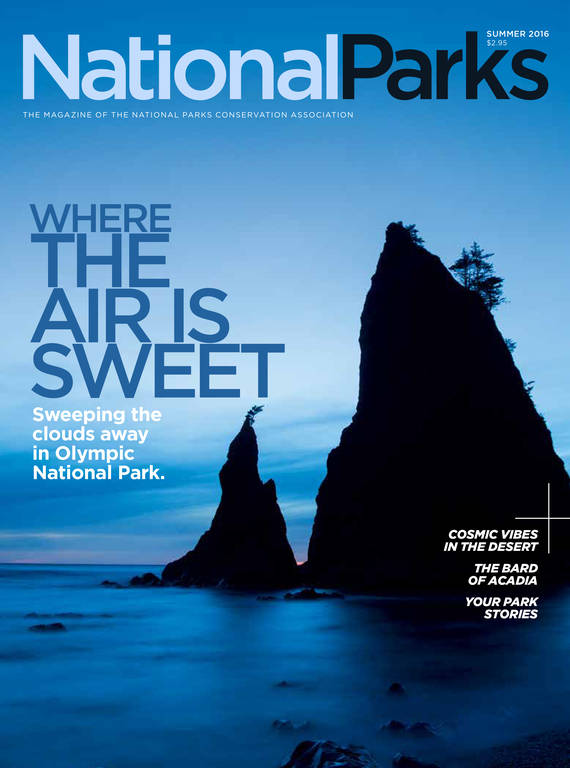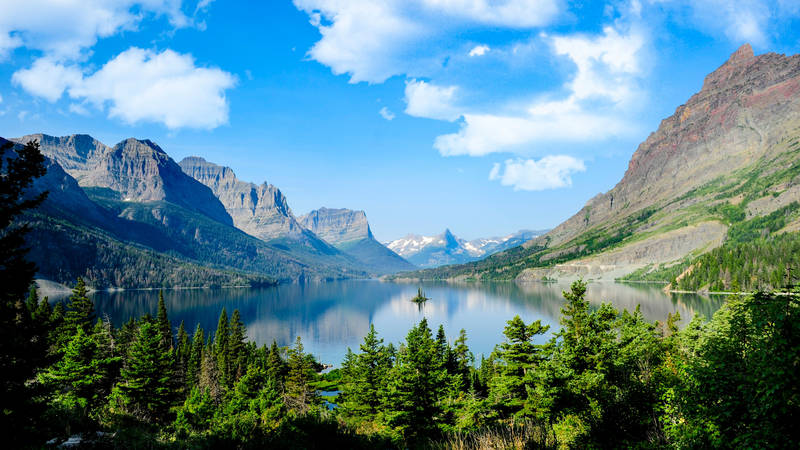Summer 2016
Cosmic Vibes Abound
Gram Parsons and his musical legacy at Joshua Tree
In the moments after the last blaze of sun slips behind the mountains at Joshua Tree National Park, stillness prevails. Dusk turns the Dr. Seuss-like trees into eerie shapes and shadows. In the dim light, they look like long bodies reaching up to the sky or contorting into alphabet letters. Beyond them lies a vast openness.
Nearly 150 miles east of Los Angeles, at the intersection of the Mojave and Colorado Deserts, the park offers a tranquility that’s exceedingly rare. Visitors who travel from messy urban sound environments are sometimes taken aback by the silence.
The first time I visited Joshua Tree several years ago, I was struck by how the harsh environment and unforgiving — yet beautiful — landscape somehow seemed to invite creativity. I savored the time for contemplation, and writing came easily. In the shade behind a rock, I sat in the warm sand, scribbling onto lined pages.
Maybe the quirky Joshua trees, which defy our understanding of life by surviving for hundreds of years in stark conditions, remind us to step out of our habitual ways. Perhaps the wildflowers that flourish with the scantest rainfall stir the imagination. Or maybe it’s that against the apparent emptiness and silence of the desert, things appear fresh and consequential. Whatever the pull, I have come to understand why artists of all types have drifted to this land for generations.
Among those who have found inspiration here, it is musician Gram Parsons whose connection to the park is possibly the most legendary. The father of what he called “cosmic American music” (and what we today describe as alt-country), Parsons is known for bringing together rock, country and blues. Curiosity about his intimate relationship with Joshua Tree — where he spent time before his death more than 40 years ago — draws visitors from around the world, especially to a spot in the northwestern section of the park called Cap Rock. The park, which logged a record 2 million visitors in 2015, is one of the top musical attractions in the world, according to a recent poll of USA Today readers.
I visited the park earlier this year to learn more about Parsons, and at the end of my first day, I found myself walking around Cap Rock. A massive formation rising high above the desert, it’s named for a large flat rock that balances precariously on one side like a beret. The climbers and hikers had dispersed, and I stood on the north side, close to a makeshift shrine to Parsons. Someone had used twigs to make a cross in the sand; a blue guitar pick lay nearby. I watched the sun disappear and waited for the stars. Orion crept across the sky. It was very, very quiet.
Later that night, the temperature plummeted to near freezing. In the campsite adjacent to mine, a small group sat around a crackling fire with a guitar. From my tent, I listened to them sing Cat Stevens’ “Peace Train” and Indigo Girls’ “Closer to Fine.” Hours later, the yips of a coyote woke me, and the moon shone on the park like a spotlight. Music remained on my mind.
A SET IN THE DESERT
Gram Parsons was born into a wealthy family of Florida citrus growers in 1946, and after meeting Elvis Presley at a young age, he decided to become a musician. Before he was out of his teens both his parents had died — his father had committed suicide, and his mother had succumbed to years of alcoholism. Parsons left the South with a large inheritance and briefly attended Harvard University. Around that time, he started the International Submarine Band. The group recorded only one album, “Safe at Home.” It wasn’t a hit — in fact, Parsons never had a hit record — but critics consider it seminal because it was one of the first to blend country music with rock ’n’ roll. Though it was released years before I was born, it influenced the music I’ve listened to most of my adult life from the Rolling Stones to Son Volt. Before I entered the park, I’d visited HooDoo, a record shop in Yucca Valley that always stocks Parsons (as well as comic books and Iron Maiden onesies), and I bought the album in white vinyl.
Parsons joined the Byrds and recorded the hugely influential “Sweetheart of the Rodeo” in the late 1960s. But his time with the band was short-lived. During a tour stop in London, Parsons became fast friends with the Rolling Stones’ Keith Richards. He decided at the 11th hour to forgo a trip to South Africa with the Byrds, ostensibly to advance his relationship with Richards. The Byrds released him from the band. Back in Los Angeles, Parsons formed the Flying Burrito Brothers and continued mixing country and rock, cultivating a look that neither camp could fully claim. The band members wore rhinestone suits designed by Nudie’s Rodeo Tailors in Hollywood; Parsons’ included embroidered naked women on the lapels, poppies on the shoulders, oblong pills up the arms, marijuana leaves on the front, a large cross on the back and red flames racing up the legs.
Famously pretty, with a pronounced jawline and dreamy gaze, Parsons wore his hair long, with bangs often covering his eyes. He accessorized with scarves, frilly collars, tasseled jackets and outrageous hats. His voice was soulful and emotive; it’s been said that women in the audience wept when he performed.
The Flying Burrito Brothers toured the country by train in a haze of psychedelic drugs and alcohol. The group wasn’t popular at the time and Parsons — who would show up to gigs late, drunk and stoned — became a liability. In the 2004 documentary “Gram Parsons: Fallen Angel,” Bernie Leadon, who went on to become a founding member of the Eagles, said, “We’d start a song in one key and one tempo, and he’d start singing the song in another key and three-quarter time.” One night a fight broke out, and band member Chris Hillman put his fist through Parsons’ guitar. Leadon recounts: “Hillman said, ‘Gram, you’re fired.’ And Gram was like, ‘You can’t fire me. I’m Gram.’ And Hillman said, ‘Well, you’re fired. Goodbye.’”
Some of those familiar with Parsons’ story say it was actor Ted Markland who introduced him to Joshua Tree, which was then a national monument with unpaved roads. Others say it was Tom Wilkes, who brought the Flying Burrito Brothers there for a photo shoot. However he found it, Parsons was hooked. Perhaps to flee the rock ’n’ roll lifestyle, perhaps to prolong some aspects of it, he escaped there on many occasions, sometimes with Richards.
“When you tour a lot, it’s the perfect place to go back to,” said Dave Catching, a local producer and musician who plays with desert rock band earthlings? and most recently toured with Eagles of Death Metal. “It’s a place that can clear your head so immediately.” Over the last three decades, Catching has regularly visited the park, sometimes writing music, other times playing his guitar and recording. He claims that in the park, he’s sensed a “spiritual vortex.” It may sound trippy and New Agey, but over several days in the high desert, I heard the exact same phrase from several musicians.
“There are certain places on Earth that are special, that draw people there,” Catching said. “It’s deeper than the beauty and solitude.” In 1973, Parsons released his solo debut, “GP,” with a young Emmylou Harris on vocals. Their exquisite duets remain a gold standard to this day: When I was in Texas recently, I saw the Black Lillies, a band fronted by singers that one critic described as the best-matched male-female duo since Parsons and Harris.
That summer, Parsons continued recording. He jammed a few times with guitarist Rojer Arnold, who grew up just outside the park. “He had a really pretty voice, and he had that spark,” Arnold told me one afternoon at the Joshua Tree Saloon. He also remembers the non-stop partying. Once, Parsons rolled up to Arnold’s house in a white Bentley, holding a liquor bottle out the window. “I got the feeling he needed to come here to be away from that stuff,” he said.
In July, Parsons and his road manager, Phil Kaufman, attended the funeral of Byrds guitarist Clarence White, who was killed in a drunk driving accident. As I heard time and again, Parsons and Kaufman made a pact there about their own deaths and Joshua Tree.
On September 19, 1973, at age 26, Parsons died of a drug overdose in Room 8 of the Joshua Tree Inn. The macabre events that followed began with Kaufman deciding to fulfill his promise to Parsons: to cremate his body at Joshua Tree and spread his ashes at Cap Rock. Questionably lucid, Kaufman and a friend stole the body from Los Angeles International Airport (where it was to be flown to the Parsons family) and drove it to Joshua Tree in a borrowed hearse. At Cap Rock, Kaufman poured gasoline inside the coffin and lit a match. As the story goes, he saw headlights, panicked and drove away. Parsons’ body was partially cremated. His remains were eventually sent to his family and are now buried in New Orleans.
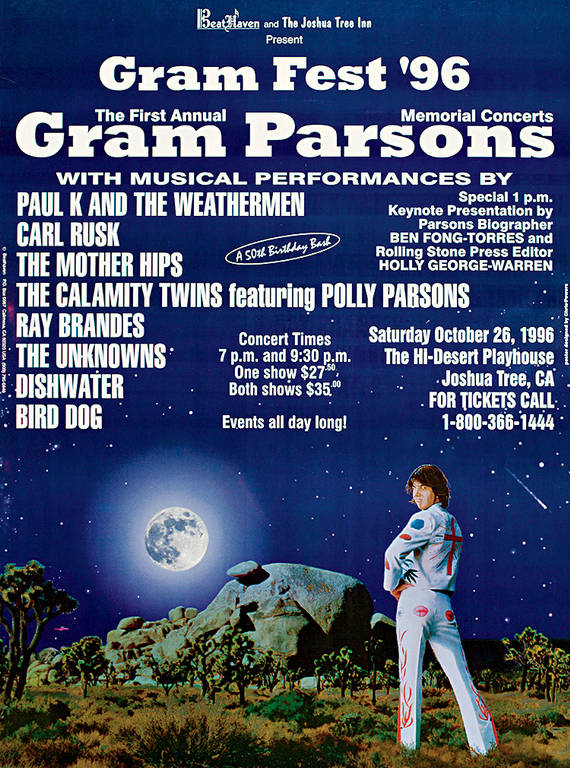
GramFest 1996 poster.
© COURTESY OF BEATHAVEN/MAD JONSome see Kaufman’s actions as loyal; others call his exploits disgraceful. For decades, the National Park Service said nothing. That will change in the near future when the park adds a marker at Cap Rock that will briefly tell Parsons’ story.
“It’s part of the cultural history of Joshua Tree,” said the park’s superintendent David Smith. “Our job is to tell that history.”
For decades, others have been telling the story, largely through music. Musician and concert promoter Jon McKinney organized an annual memorial concert, called GramFest (and later the Cosmic American Music Festival), which was held just outside the park from 1996 to 2006 and would draw hundreds of spectators each year. Scores of artists played songs written, inspired or covered by Parsons, and over the years, the events helped establish a community in and around the town of Joshua Tree.
“At that point, a lot of people didn’t know who he was,” said McKinney, who sometimes still gets goose bumps while talking about Parsons. “I wanted to capture the spirit of his music, encourage up-and-coming musicians and focus on the positive.”
Ray Brandes, who considers Parsons a major musical and spiritual influence, was the first performer booked for the original GramFest. “It was like a Beatles Fest or Star Trek convention,” Brandes said. “People across a wide spectrum of life experiences got together and felt comfortable in their obsession.”

National Parks
You can read this and other stories about history, nature, culture, art, conservation, travel, science and more in National Parks magazine. Your tax-deductible membership donation of $25 or more entitles…
See more ›The high desert here is home to about 60,000 people who live in a few small, dusty towns outside the park along Highway 62, the road through the Mojave also known as Twentynine Palms Highway. Occasionally tumbleweed somersaults across the road. Today, the area claims a community of musicians that was non-existent in Parsons’ day, while big-name artists continue to visit the park to decompress. Iggy Pop, Foo Fighters and PJ Harvey have recorded at Catching’s studio, Rancho de la Luna. Pappy & Harriet’s, a former biker bar in Pioneertown, is an internationally recognized live music venue that has hosted a diverse group of artists from Rufus Wainwright to Modest Mouse to the Pixies. Robert Plant, Led Zeppelin’s lead singer, once dropped by for an impromptu concert that locals still routinely mention in casual conversation.
Radio Free Joshua Tree founder and beloved local celebrity Ted Quinn, who is credited with keeping the local music scene alive, hosts a standing-room-only open mic night every week at Pappy & Harriet’s. He hosts a similar event at the Joshua Tree Saloon, across the street from a pizza joint where one of the pies is named the David Bowie.
“I think Gram Parsons having been here drew a gigantic singer-songwriter community to the desert,” said Eva Soltes, founder and director of Harrison House Music, Arts and Ecology, which supports artists in the high desert. She hosts resident musicians and composers and holds monthly concerts featuring local artists. “First it was a pilgrimage,” she said. “Then they came to appreciate it for the same reasons Gram did.”
A low-decibel environment, where one can hear the wind and animals, appeals to musicians, she added: “It’s a wonderful place to open your ears.”
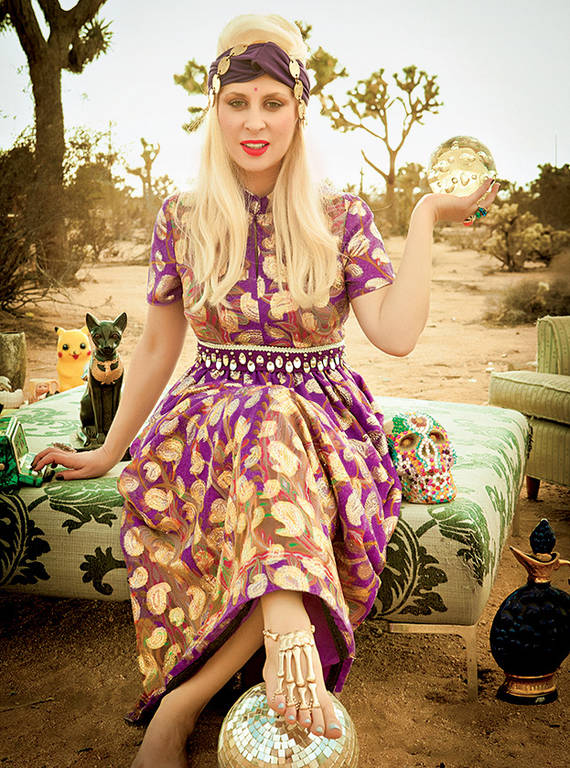
The legendary Parsons and Emmylou Harris duets inspired musician Jesika von Rabbit to form the band Gram Rabbit.
© MARINA CHAVEZEven those who aren’t devotees of American roots music have found value in Parsons’ work and story. Jesika von Rabbit never used to listen to country music, but after Todd Rutherford taught her Parsons and Emmylou Harris duets, the pair formed the band Gram Rabbit. These days, she’s pursuing a solo career, and her style is more psychedelic rock and electro-pop than alt-country, but she’s thankful that Parsons brought attention to Joshua Tree — and applauds his fashion sense.
“He’s definitely left his mark on the desert,” von Rabbit said. “His death put a little rock ’n’ roll stake here.”
One afternoon, I took a walk around Cap Rock with George Land, a ranger who considers himself the park’s unofficial music historian. He becomes animated when talking about Parsons. “It’s amazing how long the legend has lasted,” he said.
Years ago, graffiti covered the rock where fans thought Parsons was cremated. People had the spot wrong, Land said. He added that the graffiti was a misguided way to honor Parsons, who cared enough about the park that he wouldn’t have wanted people tagging it with spray paint. Today, the Park Service swiftly removes any markings. “You can pay your respects and leave no trace,” he said. “Cap Rock is not a highway bridge in South L.A.”
A short drive away, the Joshua Tree Inn, a roadside inn that once hosted John Wayne, is considered the epicenter of Parsons homage. I had spent a couple of nights there in the beginning on my trip, down the corridor from Room 8, where Parsons died. That room, which some claim is haunted, is booked months in advance. Guests from around the world leave messages and sketches in a book by the bed. “From one grievous angel to another,” one message reads; another guest wrote, “Cosmic vibes abound in this room! Joshua Tree always provides the perfect recharge.”
Motivated by little more than a gut feeling, Margo Paolucci purchased the inn in 2002. The previous owners had tried to cover up the Parsons connection, but Paolucci felt called to celebrate his accomplishments and honor his memory. The common areas are covered with art, posters and articles connected to Parsons. In pleasant weather, doors open, guitars come out and music fills the courtyard, where a memorial includes a large stone guitar and mementos left by visitors. Among the items: a fiddle bow, cowboy boots and a small Canadian football flag.
The folks I’d heard singing around the campfire, I found out the next morning, were visiting from Edmonton, and they’d planted the flag at the inn. As we all packed up our tents in the park, I learned that they were a group of 50-something professionals, hikers and music historians who played in a rock cover band.
We chatted a bit about Parsons. They were heading out for a hike, but on the way, they stopped at Cap Rock with their rented guitar. I came along and stood off to the side, listening to them play Emmylou Harris’ tribute song to Parsons, “Boulder to Birmingham.”
ABOUT THE PHOTOGRAPHER
Well you really got me this time
And the hardest part is knowing I’ll survive. …
I would walk all the way from Boulder to Birmingham
If I thought I could see, I could see your face.
As they finished playing, the sun began peeking around the east side of the rocks. “We feel a connection to Gram through this physical place,” said one of the singers, a space physicist named Dave Milling. “He was drawn to it. And we are, too.”
About the author
-
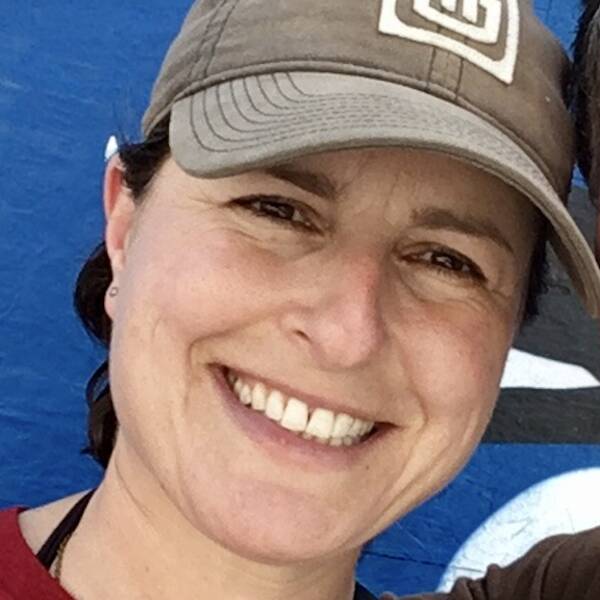 Melanie D.G. Kaplan Author
Melanie D.G. Kaplan AuthorMelanie D.G. Kaplan is a Washington, D.C.-based writer. She is the author of the book "LAB DOG: A Beagle and His Human Investigate the Surprising World of Animal Research" (Hachette/Seal Press, 2025).
